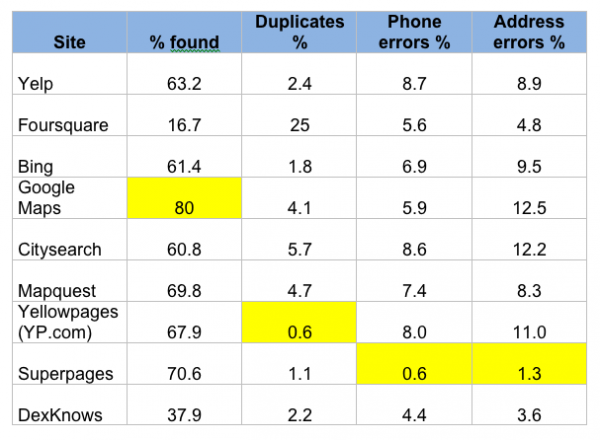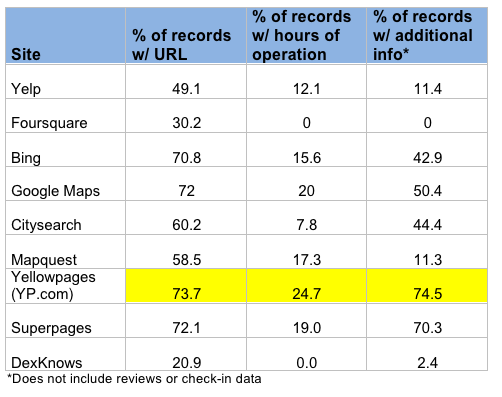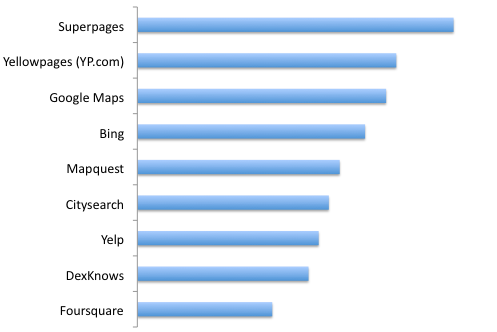http://searchengineland.com/yellowpages-sites-beat-google-in-local-data-accuracy-test-118467
Yellow Pages Sites Beat Google In Local Data Accuracy Test
Apr 16, 2012 at 10:40am ET by Greg Sterling
 In the brave new world of “SoLoMo” there are an increasing number of sites and mobile apps competing to help you choose a local business or lead you there. In addition to Google Maps, Yelp and Foursquare there are the venerable yellow pages’ sites and many others. They all get their local data from generally the same several sources; so one might expect all these sites to have comparably accurate information, right?
In the brave new world of “SoLoMo” there are an increasing number of sites and mobile apps competing to help you choose a local business or lead you there. In addition to Google Maps, Yelp and Foursquare there are the venerable yellow pages’ sites and many others. They all get their local data from generally the same several sources; so one might expect all these sites to have comparably accurate information, right?
Apparently not.
Roughly a month ago I spoke with Marc Brombert, the CEO of Implied Intelligence. His company provides a range of data-related services (e.g., enhancement, cleansing, de-duplication) to marketers and publishers. At the conclusion of our call I suggested that Implied Intelligence test the accuracy and completeness of the business listings data on several of the leading local search sites.
Surprise: Yellow pages beat Google for local search
Several weeks later Implied Intelligence sent me the results of its test. They’re a bit unexpected and illuminating. Google, which has probably devoted more effort and resources to local search than any of its competitors, did not come out on top in the test. Overall it placed third. Two yellow pages sites beat it.
Implied Intelligence crawled and hand checked 1,000 independent local business websites in the US (no chains or franchises were included in the test) and compared the information it captured to the data contained on the following sites:
- Bing Maps
- Citysearch
- Dexknows
- Foursquare
- Google Maps
- Mapquest
- Superpages
- Yellowpages.com (YP.com)
- Yelp
The criteria and results
Implied Intelligence evaluated and scored the local search competitors on the basis of the following criteria:
- Coverage (was the listing present)
- Number of duplicates
- Accuracy of information
- Richness of information (presence of additional information beyond business name, address and phone)
The first table below offers a comparison among these sites in terms of basic listings coverage and accuracy. The yellow highlighting indicates the winner in each category.

The table reflects that Google Maps had the most complete coverage: 80 percent of the 1,000 local listings were present. No site had 100 percent of the 1,000 listings. Foursquare had the worst coverage at only 16.7 percent.
In terms or error percentages yellow pages site Superpages outperformed the others. YP.com had the fewest duplicate listings in the test.

In terms of enhanced information, YP.com was the winner. Reviews and check-in data were not considered because Implied Intelligence felt this didn’t allow for an “apples to apples” comparison across sites. However, had reviews content been included Yelp, Google and Foursquare would likely have fared better.
Superpages the overall winner
Overall Superpages was the winner, followed by YP.com with Google Maps coming in third. Foursquare was the overall loser. However Yelp also didn’t fare that well either.

To many people these results will be a surprise. (They were to me to some degree.) And some people may charge bias. While I didn’t supervise the test and was not involved in its design I can report that Implied Intelligence has no agenda here. I would and do take the results at face value.
Related Topics: Google: Maps & Local | Search Engines: Maps & Local Search Engines | Top News
About The Author: Greg Sterling is a Contributing Editor at Search Engine Land. He writes a personal blog Screenwerk, about SoLoMo issues and connecting the dots between online and offline. He also posts at Internet2Go, which is focused on the mobile Internet. Follow him@gsterling. See more articles by Greg Sterling
Connect with the author via: Email | Twitter | Google+ | LinkedIn

SearchCap:
Get all the top search stories emailed daily!


Showing 8 comments
It’s worth mentioning that the overall search traffic that Google receives dwarfs that of the Yellow Pages and Super Pages. Even if their results were not as accurate, if we’re talking about actual opportunities (clicks and impressions) than Google wins hands down!
What’s your point Marc? Are you arguing for quantity ahead of quality? Consumers are fickle creatures, and particularly with location-dependent search. Clicks and impressions to inaccurate data will eventually hurt Google if it doesn’t sort its accuracy issues. Big doesn’t always mean best, especially if it sends you somewhere miles away from where you wanted to be!
Not at all…obviously having 10 people show up at your site with their credit card in hand is more valuable than 100 that are there by accident while looking for a different product or service. However, you also need to go where the people are. I don’t know very many people that search the Yellow Pages or Super Pages when looking for anything. Their first stop is usually Google. Like it or not. The Yellow/Super pages are a fraction of a percent. Now, that may very well change some day in the future in which case I would change my strategy if that day ever came, but as it stands right now, it’s not hurting Google to be a few percentage points down. Besides, it’s not as if Google were just sitting back and doing nothing about it. They are constantly adjusting their algorithms in order to improve their results so it’s going to be tough to sneak up and pull the rug out from under them.
Good point Marc!
Since I fight with Google Places duplicate listings constantly and ALL my clients have problems with duplicates, I’m surprised the number is not higher. I do realize my numbers are skewed because I specialize in professionals that are more prone to dupes than say Plumbers are, but still.
Also interesting to see Places has the highest percentage of address errors. 12.5%. I work in the Places forum helping folks with problems daily so see lots of errors, but still 12% seems pretty high.
I’m not really surprised at the results of YP & SP. Reason being is they employed many Sales Advertising Professionals over the years and made sure they crossed their “T’s” & dotted their “i’s”, that was their job!
The errors in Google Places/Maps are user errors, small business owners making an attempt to add their information and get interrupted (phone rings, etc) and forget to go back and complete, I’ve seen it many times when I’m asked to assist in their local marketing efforts.
Garbage in, garbage out…
–Dennis
I wonder what the criteria was for selecting sites to be included in this study. Merchant Circle wasn’t included and they’re one of the more popular “find this business in city” sites (at least according to Alexa, however big a grain of salt you want to give those stats). Albeit, Yelp is bigger, but they’re still up there.
I don’t expect that MC would have fared very well, but I wonder if some sites were missed that would have scored better than some of the ones included.
That Superpages and YP are more accurate doesn’t surprise me at all. They have more feet on the street and more opportunities for their sales staff to correct their listings.
What does surprise me is that Google Places-Maps has the most complete coverage at 80%. I would have thought that Superpages and YP would be even higher.
Google has done a good job of making sure that there are local listings so that they can provide the most relevant search results from a local user standpoint. I just searchedyp.com for carpet cleaning in Keller, tx and the results showed 3 to 4 mostly non-local companies and one local plus one 800 # serving Keller. AND that was just the paid ads (you can’t even see the free ads below the fold on the site)
http://www.yellowpages.com/kel…
Do the same search on Google and you get a 7 pack of 5 local and 2 near local.
Google still delivers the best local search results accurate or not!
Im still a Google fan thru and thru!
Add New Comment